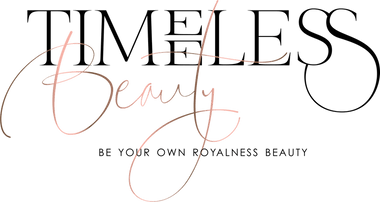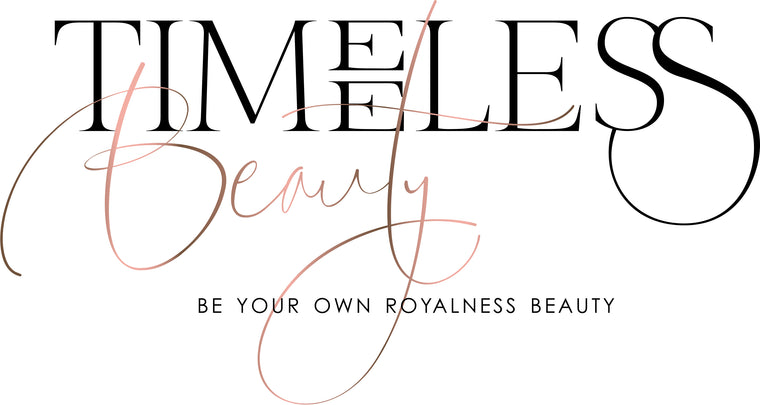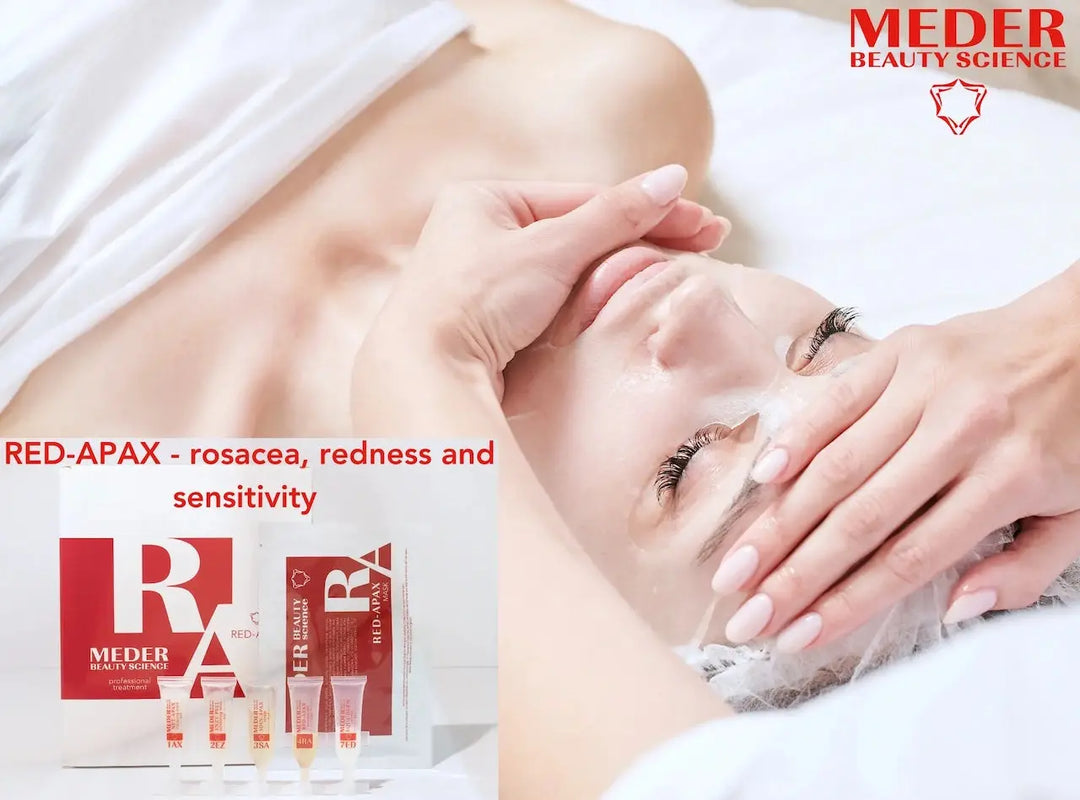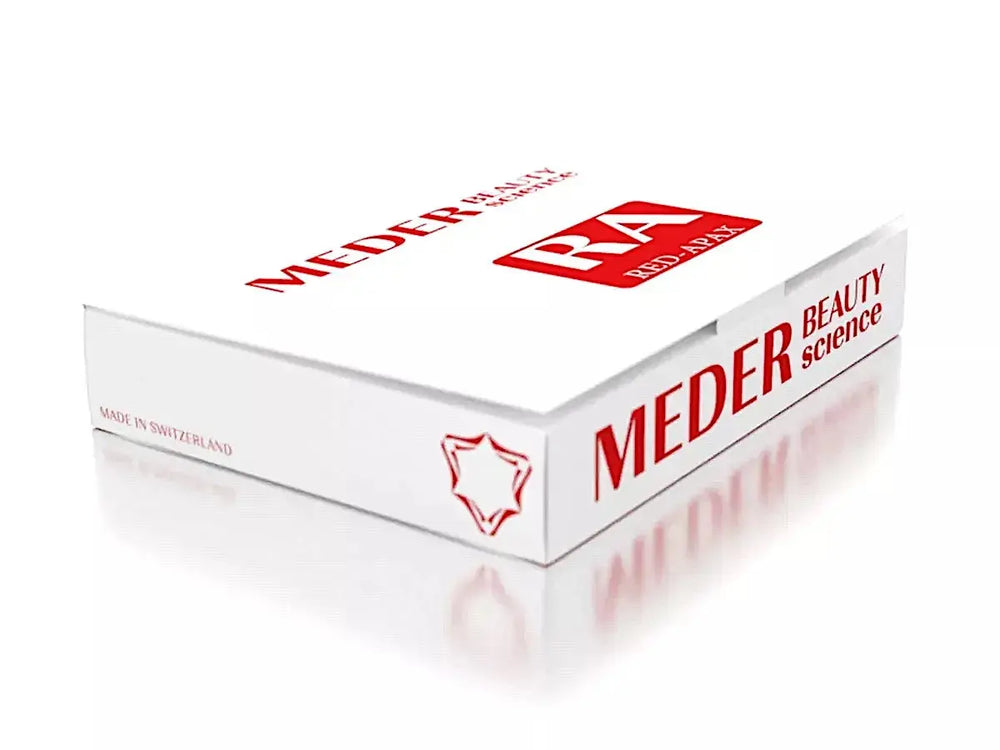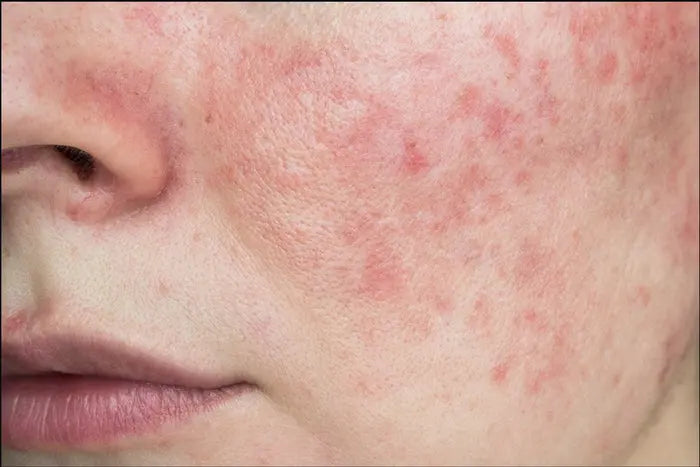
ROSACEA
Taking Good Care of Your Skin
Redness/ Rash
Inflammation
Discomfort
Tingling
Burning
Bumps/pimples
Sensitivity
Irritation
About Rosacea
Rosacea is a common skin condition that primarily affects the face, causing redness, visible blood vessels, swelling, and sometimes acne-like bumps.
The exact cause of rosacea is not fully understood, remains elusive despite extensive research.
Factors are believed to contribute to its development:
• Genetics: Family history of rosacea may increase the likelihood of developing the condition.
• Abnormalities in blood vessels: Dysfunction in the blood vessels of the face may lead to flushing and redness characteristic of rosacea.
• Demodex mites: These microscopic mites that normally inhabit facial skin may contribute to inflammation in individuals with rosacea.
• Environmental triggers: Exposure to sunlight, hot or cold weather, wind, spicy foods, alcohol, and certain skincare products can exacerbate rosacea symptoms.
• Immune system response: Abnormal immune system responses may play a role in the development of rosacea, although the exact mechanisms are not fully understood.
• Microorganisms: Certain bacteria or other microorganisms on the skin may trigger inflammation and contribute to rosacea symptoms, though research on this is ongoing.
While rosacea primarily affects the skin, there is evidence to suggest that it may involve interactions with the nervous system. The exact mechanisms linking rosacea and the nervous system are not fully understood, but studies have shown that various neurovascular and neuroimmune factors may play a role in the development and progression of rosacea. For example, abnormalities in nerve signaling pathways and neurotransmitters, as well as increased sensitivity of nerve endings in the skin, have been observed in individuals with rosacea. Additionally, stress and emotional factors, which can impact the nervous system, are known triggers for rosacea flare-ups in some individuals.
Triggers for rosacea vary among individuals:
• Sun exposure: Exposure to sunlight or ultraviolet (UV) radiation can exacerbate rosacea symptoms.
• Hot weather: High temperatures and humidity levels can lead to flushing and flare-ups.
• Spicy foods: Consuming spicy foods and beverages can cause flushing and irritation in some individuals with rosacea.
• Alcohol: Drinking alcoholic beverages, particularly red wine and hard liquor, can trigger flushing and worsen rosacea symptoms.
• Hot beverages: Consuming hot drinks like coffee and tea may induce flushing and increase skin sensitivity.
• Stress: Emotional stress and anxiety can contribute to rosacea flare-ups in some people.
• Certain skincare products: Harsh or irritating skincare products, such as those containing alcohol or fragrances, may aggravate rosacea-prone skin.
• Exercise: Intense physical activity and exercise can lead to increased body temperature and sweating, potentially triggering rosacea symptoms.
• Medications: Some medications, such as vasodilators and topical steroids, may worsen rosacea symptoms as a side effect.
• Environmental factors: Exposure to wind, cold temperatures, and indoor heating can also trigger rosacea flare-ups in susceptible individuals.
• Immersing in hot baths: Hot baths can aggravate symptoms of rosacea, leading to increased redness and irritation.
Several strategies to help control symptoms and minimize flare-ups:
Gentle Skincare Routine: Use mild, non-abrasive cleansers and moisturizers suitable for sensitive skin. Avoid harsh products, exfoliants, and rough scrubbing that can irritate the skin.
Sun Protection: Shield your skin from the sun by wearing broad-spectrum sunscreen with SPF 30 or higher daily. Additionally, use hats and seek shade to minimize sun exposure.
Avoid Triggers: Identify and avoid triggers that exacerbate rosacea symptoms, such as spicy foods, hot beverages, alcohol, extreme temperatures, and stress.
Manage Stress: Practice stress-reduction techniques like meditation, yoga, deep breathing exercises, or hobbies to help manage emotional stress, which can trigger rosacea flare-ups.
Gentle Makeup: Opt for hypoallergenic, fragrance-free makeup products designed for sensitive skin. Remove makeup gently and avoid products that contain irritants.
Medications: Depending on the severity of your rosacea, your dermatologist may prescribe topical medications, oral antibiotics, or other treatments to reduce inflammation and control symptoms.
Dermatologist Consultation: Regularly consult with a dermatologist to monitor your condition, adjust treatment as needed, and discuss new therapies or interventions.
Stress activates the body's "fight or flight" response, leading to the release of stress hormones like cortisol, which can trigger inflammation and vasodilation (widening of blood vessels) in the skin. This can result in increased redness, flushing, and sensitivity in individuals with rosacea.
Managing stress through relaxation techniques, mindfulness practices, and stress-reduction strategies may help individuals with rosacea minimize flare-ups and improve overall well-being.


